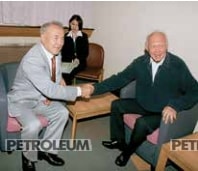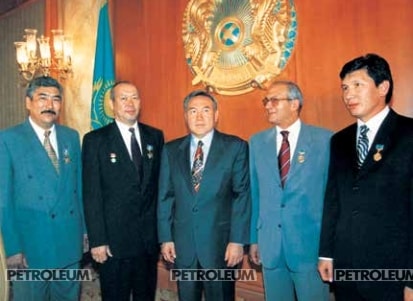Retrospective
Black Gold of Independence
Oleg Chervinskiy, editor in chief of Petroleum MagazinePetroleum Magazine and Ratel analytical internet website on the eve of the 25 anniversary of Independence produced a special series of publications under the general heading Black Gold of Independence. We offer our readers remember how and in what circumstances arose and found feet of the oil and gas industry of independent Kazakhstan. Full cycle can be read on the website www.ratel.kz
(Continuation. See the beginning in the issue #1-2017)
2000 How Putin allocated a personal quota for Indonesians in Kazakhstan.
 Nursultan Nazarbayev and Lee Kuan Yew
Nursultan Nazarbayev and Lee Kuan YewShkolnik Founds Common Ground
Millennium poses new challenges for the country and its industry. The Ministry of Energy, Industry and Trade proclaims the energy independence of the country as the priority of its activity, therefore we need to saturate the domestic market with the domestic oil products. Disparities between export oil prices and those prices, at which domestic refineries willing to purchase raw materials, leads to the fact that oilmen are trying to pump all produced oil abroad, while oil refineries suffer from the lack of raw materials. Twice a year, during the sowing and harvesting seasons, agriculture suffers from the lack of fuel, but for the rest of time, the country needs are covered by imports of the Russian gasoline.
To rectify the situation, the Ministry decides to bind the export quotas, allocated by it, with obligations to supply raw materials to the domestic market. Total exports volume in 2000 is limited to 22 mln tons, while the planned production volume equals 30.5 mln tons. Such a solution was received without enthusiasm by investors. Kazakhstan Petroleum Association, which consists of top managers from 30 foreign oil companies in Kazakhstan, publicly express its disagreement with the Governmental decision. Edward Verona, the Association Chairman, representing the American Texaco, reminds that many companies work in Kazakhstan under the production sharing agreements, providing that produced oil can be exported according to the needs of the company. If some conditions come into force, involving the protection of national interests of Kazakhstan, then the Government must compensate the difference in prices that can occur. "Will the oil producing companies want to supply such a volume of oil to domestic market at a price, which is much lower than the world one?", Mr. Verona asks the rhetorical question.
 President Nursultan Nazarbayev with awarded heads of international consortium Kazakhstancaspiyshelf
President Nursultan Nazarbayev with awarded heads of international consortium Kazakhstancaspiyshelf
The Ministry gathers all the market participants to the closed-door meeting, at the end of which the Minister Vladimir Shkolnik says: "We found a common ground.” He stressed that the obligations for domestic refinery throughput are shared equitably. While doing so, oil transportation facilities, pipeline accessibility and geographical location towards the refinery were taken into account. But on average, approximately 23% of oil produced by each company now will remain in the country, with the exception of Kazahoil and MangystauMunaiGas, whose throughput will be about 40 %. In return, each oil producing company will obtain its personal export quota.
Indonesians From Kazakhstan Promise To Build Refinery In Russia
Such a high throughput on the MangystauMunaiGas (MMG) caused by the fact that the property complex of the Pavlodar oil refinery was transferred to MMG as a dept repayment for delivered oil after the termination of the Public Private Partnership agreement with CCL Oil. Pavlodar petrochemical plant JSC was established on the basis of property of Pavlodar oil refinery, with MangystauMunaiGas JSC as its sole founder and shareholder.
Close contacts between the owner of JSC Central Asia Petroleum company and decision makers in the Russian oil and gas industry became another argument in favour of the refinery transfer expressly to MMG, because traditionally, Pavlodar refinery is strongly connected with Russian oil. In particular, during the introduction of export quotas in Kazakhstan, the Ministry of Energy explained the allocation of additional quotas for MangystauMunaiGas by the fact that these quotas were allocated personally by Vladimir Putin, Acting President of the Russian Federation. Perhaps, it was made in return for the declared intention of Central Asia Petroleum to build a modern oil refinery in Russia.
By Sleigh of Hands KazVit Turns Into Kazkom



